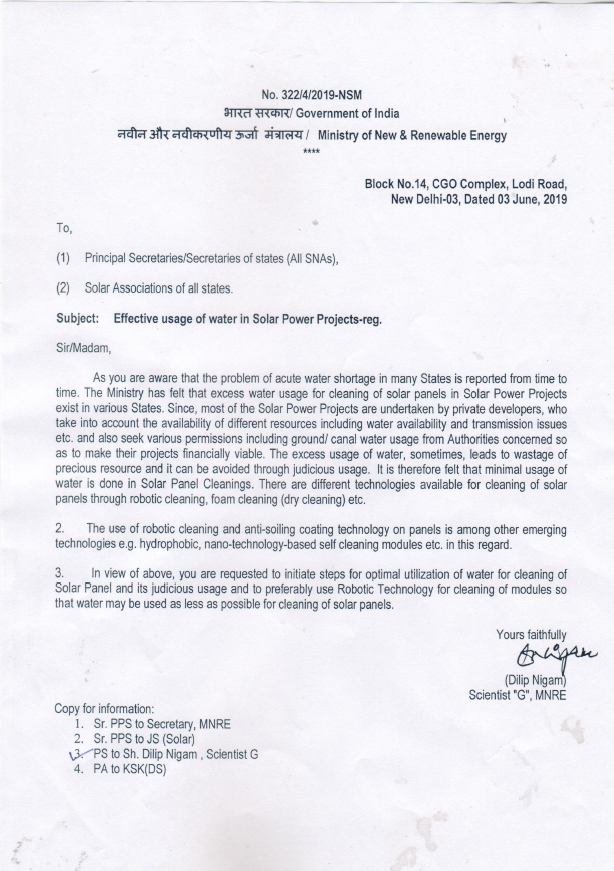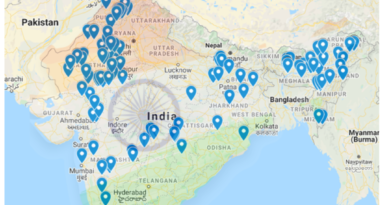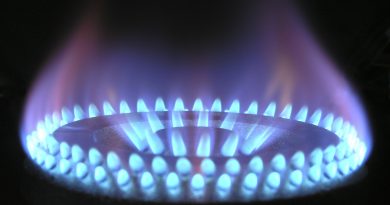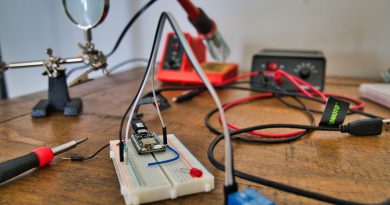Water Conservation in Solar PV Plants: Need and Possibilities
Is the promotion of utility scale Solar projects a sustainable solution? The answer disheartened me very much in a workshop and the key reason was the usage of agricultural lands and water for setting up and maintaining the Solar PV plants. I also questioned myself how we can call these Solar plants a source of clean energy when they use natural resource irreversibly. In some cases, the water is brought from a remote location in diesel fuelled tractor and again diesel pumps are used to utilize. Hitherto, the solar PV plants in India were using the water for module cleaning mainly 02 times in a month and the first time the Ministry of New and Renewable Energy (MNRE), Government of India has suggested to all the state nodal agencies issuing a letter on 03rd June 2019 to explore the other possibilities and minimize this precious natural resource as much as possible. This approach has potential to kill 02(two) birds by throwing a single stone that is water conservation as well as saving pumping energy in the form of electricity or diesel oil. Through the letter MNRE has commented that the developers are using excess water for module cleaning and need to explore other options like robotic cleaning, anti-soiling coating technology, etc. for reducing the water consumption.

The potable quality of water is used for module cleaning and Reverse Osmosis (RO) system is used to get potable water in the plants where acceptable quality of water is not available. This is another side of the problem of using the water for module cleaning as hardly the RO wastewater is treated before releasing to the environment and RO system itself increases auxiliary power consumption.
The water conservation initiative is also important from the point of view that utility scale big capacity solar power plants come up in those areas where water is already scarce. India has an ambitious target of 100 GW of Solar PV Energy generation by 2022 and the water scarcity can hamper this ambitious plan. The sources of water in solar plants can be borewell, water tanker, etc. As per the study by the renewable energy research firm Bridge to India, the 60% of the water source is borewell in India. The study recorded ‘very high’ water consumption at plants in Rajasthan, UP, Gujarat, Punjab and Haryana, where a quarter of India’s installed capacity is located. Tamil Nadu, Karnataka and MP, with 38% of solar plants, have ‘high’ water consumption levels. But still water requirement in Solar PV plants is still a fraction of the water consumption by coal based thermal power plants.
Again, the regular cleaning of the solar panels is very much important in the arid and semi-arid areas where around 79% of the solar capacity additions are supposed to happen. It has been observed that due to dust accumulation the efficiency of the solar systems gets affected very much. As per the CEEW estimation the water requirements for operation and maintenance in India to lie between 7000 and 20000 litres per MW per wash. This make the solar plant not only non-economical but also non-sustainable to operate. The solution is to go for water less cleaning which has the potential to make the utility scale solar plant projects a sustainable solution as far as water conservation and power requirements is considered. The effort should be to explore other possible water efficient or 100% water free solar module cleaning solutions as well in various parts of India based on the environmental conditions of the plant location.
References:
- https://mnre.gov.in/sites/default/files/uploads/MNRE%20Advisory%20reg%20effective%20usage%20of%20water%20in%20Solar%20Power%20Proje.pdf
- https://www.financialexpress.com/economy/govt-roots-for-robots-to-cut-water-usage-in-solar-plants/1599194/
- http://www.germi.org/downloads/GERMI%20O&M%20Handbook%20for%20RTPV%20Systems.pdf




Pingback: Water Management in Facilities for Global Water Crisis - SolarPost